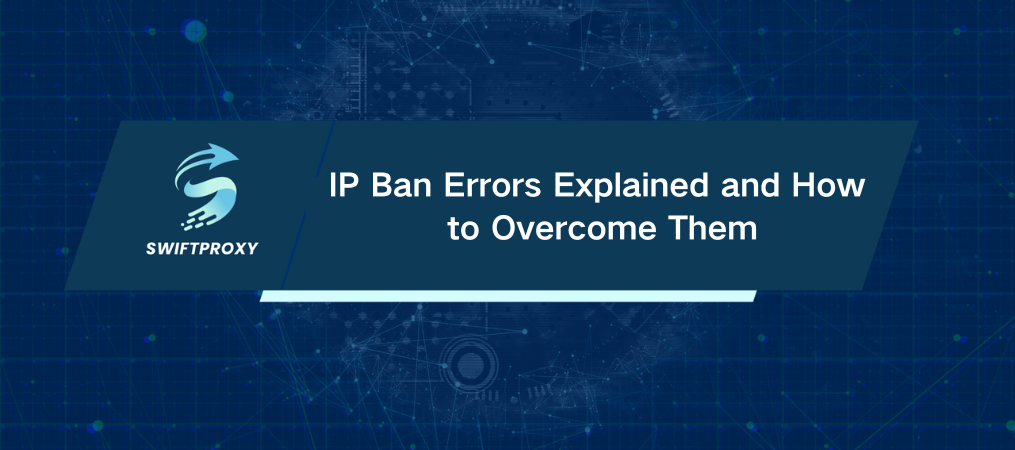IP Ban Errors Explained and How to Overcome Them

A common issue for web scrapers is encountering the "Your IP Address Has Been Banned" message. This can be frustrating, but it doesn't have to end your scraping activities. If you're scraping websites for data without the proper strategies, this problem may arise frequently. So, what causes the IP ban error, why does it happen, and how can it be resolved?
Let's explore the underlying causes, how to fix the issue, and some best practices to prevent future blocks.
What is an IP Ban
An IP ban happens when a website blocks your IP address due to unusual behavior or activities that appear automated. It's essentially the website's way of saying, "You've overstepped." This can happen after frequent scraping or sending too many requests in a short amount of time. The site's goal is simple: protect its content and resources from overload or misuse.
However, there's good news. With the right approach, your scraping efforts can continue without interruption.
Why Does an IP Ban Error Happen
Excessive requests, especially when made too quickly, are a common trigger for IP bans. Websites often detect rapid, repeated requests as bot behavior and may block access. To avoid this, slow down your requests and space them out over time. This will help mimic human browsing patterns and reduce the likelihood of being blocked.
Violating Terms of Service Many websites don't take kindly to scrapers violating their terms. It's crucial to read the fine print. Violating anti-scraping policies can lead to temporary or permanent bans. So, always check the website's rules before scraping.
Ignoring Robots.txt Websites use a file called robots.txt to specify which parts of their site should be off-limits for crawlers. If you ignore these directives, you're asking for trouble. Always check the file and respect its rules to avoid getting banned.
Non-Human Behavior Modern websites aren't fooled easily. They use sophisticated tools to detect non-human behavior—like repetitive patterns, excessive speed, or constant actions without breaks. These can quickly get you flagged as a bot. Human-like interactions—such as adding delays or mimicking mouse movements—can make a world of difference.
Failed CAPTCHA Challenges CAPTCHAs are designed to stop bots in their tracks. If your scraper keeps failing them, it's a red flag. Repeated CAPTCHA failures signal to the site that a bot is in action. And that's how an IP ban happens.
Which Websites Are Likely to Ban Your IP
Many sites have IP banning mechanisms in place, particularly if you're scraping sensitive data. Here are some common offenders:
eCommerce platforms (Amazon, eBay): They block scrapers trying to gather pricing or product info.
Social media networks: They protect user data and prevent mass extraction of profiles or posts.
News and media outlets: They guard against unauthorized copying of articles.
Job boards: To ensure fair access to job listings and avoid scraping job data.
Travel websites: To prevent manipulation of booking or price data.
Financial sites: To stop scrapers from collecting market data for trading algorithms.
Fixing an IP Ban Error
So, your IP's been banned. What now?
Solution 1: Leverage Proxies
Proxies are your first line of defense. By rotating IP addresses, you can mask your real IP and distribute requests across multiple addresses. Here's a quick how-to:
Choose a reliable proxy provider.
Get proxies with high-quality IP pools.
Set up the proxy in your scraping tool (e.g., X Browser).
Test your setup on a website like Amazon.
Solution 2: Reduce Request Speed
The key is to avoid overwhelming the server. Implementing a slight delay between requests will make your activity look more natural. Try limiting your requests per second, and vary the delay times to mimic human interaction.
Solution 3: Leverage Advanced Scraping Tools
Don't settle for basic tools. Advanced scraping solutions can automatically rotate IPs, solve CAPTCHAs, and simulate real user behavior like scrolling or clicking. These tools often come with built-in features to bypass anti-bot defenses and keep your scraping activities under the radar.
For instance, consider using an API, which is pre-configured to handle the complexities of scraping platforms like Amazon. These APIs save you time and effort, letting you scrape data quickly and accurately.
How to Avoid IP Ban Issues
It's always easier to prevent than to fix. Here's a checklist to keep your scraping clean:
IP Switching: Regularly change IP addresses to make it appear like requests are coming from different users.
Use Residential Proxies: These proxies make it look like your requests are coming from real users, making detection harder.
Mimic Human Interaction: Mimic human browsing patterns—use varying User-Agent strings, random delays, and CAPTCHA solvers.
Distribute Scraping Tasks: Avoid overloading a single IP by spreading scraping across multiple servers.
Respect robots.txt: Always check the file before scraping to ensure you’re not violating the site's rules.
Conclusion
The "Your IP Address Has Been Banned" error is a common challenge for web scrapers. But with the right strategy, you can prevent and fix it. By slowing down your requests, rotating IPs, and using advanced scraping tools, you'll reduce the chances of running into bans. Just remember—scrape responsibly, respect site policies, and adjust your strategy when necessary.

















































